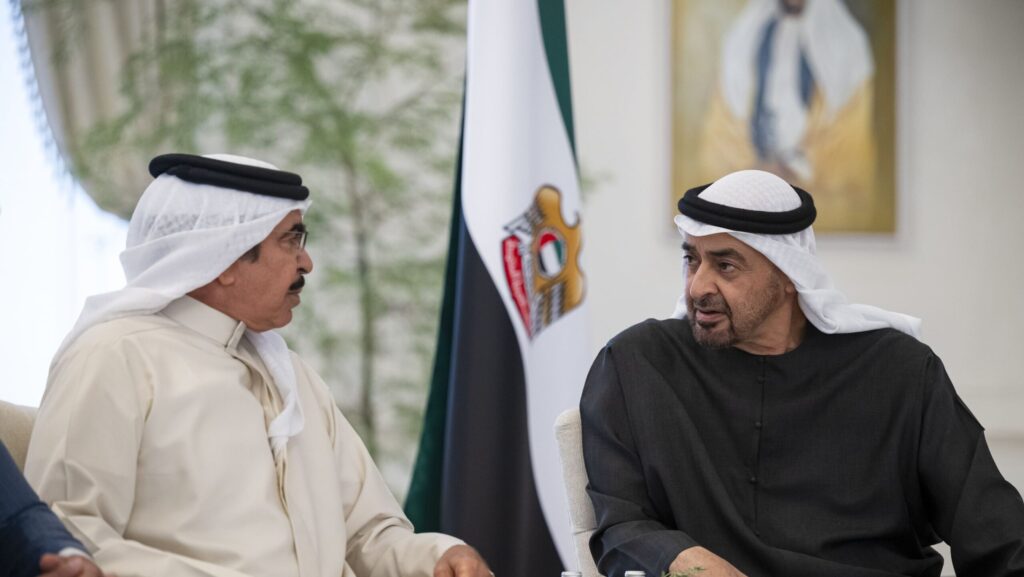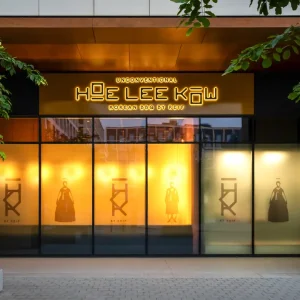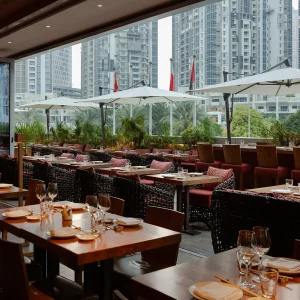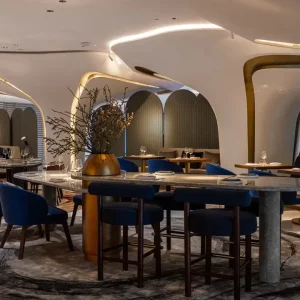The United Arab Emirates once again took center stage in global diplomacy as President Sheikh Mohamed bin Zayed Al Nahyan hosted an official gathering with top security officials from an international alliance. The UAE President security alliance meeting represented not just a regional discussion but a landmark event in shaping the framework of future international cooperation and peace.
Held at the grand Qasr Al Bahr in Abu Dhabi, the meeting brought together ministers, delegates, and security leaders from multiple nations. Their mission was clear — to reinforce global stability, build trust among allies, and strengthen coordinated responses to emerging global threats.
President Sheikh Mohamed bin Zayed emphasized that true security cannot be achieved in isolation. It is the product of collaboration, knowledge sharing, and collective commitment to peace. His remarks reflected the UAE’s growing reputation as a nation that blends forward thinking leadership with a pragmatic vision for sustainable security.

The vision behind the UAE President security alliance meeting
The UAE President security alliance meeting was designed to be more than a routine diplomatic engagement. It was an opportunity to rethink the meaning of cooperation in an age where challenges transcend borders.
President Mohamed bin Zayed has long advocated for the UAE’s active role in fostering stability not just within its own borders but across the region and the world. The meeting served as a platform to reaffirm that belief. It reflected the UAE’s unwavering commitment to global partnerships, intelligence cooperation, and peacekeeping efforts.

In his opening address, the UAE President highlighted the importance of human unity, mutual respect, and trust as foundations for lasting peace. He noted that today’s challenges from cyber attacks to climate related risks require collective solutions, not isolated efforts.
He urged all attending officials to work together in shaping new frameworks of cooperation that could safeguard societies, economies, and shared futures.
An emphasis on shared responsibility
One of the core messages that emerged from the UAE President security alliance meeting was that security is a shared responsibility. The President stressed that every nation, regardless of its size or influence, has a vital role to play in maintaining stability.
He emphasized that cooperation must go beyond traditional security measures. It must include education, technology, cultural understanding, and social well being all of which are interconnected with peace and resilience.
The UAE President reiterated that real progress happens when nations align their goals for the greater good, focusing on prevention rather than reaction. His message resonated deeply with attendees, many of whom agreed that global partnerships must evolve in response to modern challenges.
The setting Qasr Al Bahr a symbol of heritage and diplomacy
The meeting took place at the iconic Qasr Al Bahr, a place that blends Emirati tradition with global openness. The palace’s serene environment set the tone for constructive dialogue, diplomacy, and mutual respect.
The UAE has long used such spaces as platforms for meaningful engagement. Hosting international delegations at venues like Qasr Al Bahr sends a clear message the UAE stands ready to welcome the world and lead conversations that matter.
Attendees were greeted by President Sheikh Mohamed bin Zayed and key UAE officials, including Sheikh Saif bin Zayed Al Nahyan, Deputy Prime Minister and Minister of the Interior. The meeting atmosphere was both formal and forward looking, reflecting a blend of heritage and modern ambition.

Key discussions and agenda highlights
Throughout the day, participants engaged in deep discussions covering multiple dimensions of global security. The UAE President security alliance meeting addressed urgent topics such as cross border cooperation, cyber resilience, intelligence sharing, and humanitarian stability.
Reinforcing institutional coordination
The first major discussion point revolved around institutional coordination. Participants recognized that fragmented responses often weaken the ability to address security threats effectively. The meeting emphasized creating channels for consistent communication and faster decision making among international partners.
President Mohamed bin Zayed noted that the strength of any alliance lies not in its size but in its ability to act together efficiently. Countries agreed that technology and real time data sharing should become core elements of modern security systems.
Confronting modern and emerging threats
As the world faces complex security dynamics including cybercrime, disinformation, terrorism, and new forms of warfare, the UAE President urged global partners to remain proactive.
He pointed out that threats are no longer confined to geographical borders; they often exist in digital spaces and economic systems. To confront these new realities, nations must embrace adaptability and innovation.
Delegates discussed methods to modernize their response mechanisms, including enhancing cybersecurity networks, integrating AI driven surveillance, and promoting research collaboration among security agencies.
Promoting peace through development
The meeting also linked peace and security to sustainable development. President Sheikh Mohamed bin Zayed reminded participants that stability flourishes when societies are empowered through education, employment, and equality.
He emphasized the UAE’s own example, where economic prosperity and social inclusiveness have built one of the safest and most resilient environments in the region.
Attendees agreed that peace cannot be imposed; it must be cultivated through opportunity and fairness. They discussed the importance of reducing inequalities and improving quality of life as essential elements of long term global security.
Expanding humanitarian cooperation
The UAE President security alliance meeting also touched on humanitarian collaboration. The UAE, known for its active role in global relief efforts, encouraged nations to view humanitarian aid as part of the broader security framework.
When crises whether natural disasters or conflicts go unaddressed, they often give rise to instability. Therefore, humanitarian partnerships and swift responses were identified as key preventive tools.
President Mohamed bin Zayed expressed his hope that future cooperation would not only include defense strategies but also extend to humanitarian readiness and rapid assistance programs.
Building the future of global partnerships
Perhaps the most forward thinking theme was building sustainable partnerships. The UAE President highlighted that alliances must not be temporary. They should evolve, adapt, and deepen with time.
He encouraged participating officials to create enduring mechanisms that ensure dialogue continues beyond the meeting. He called for a roadmap that outlines both short term actions and long term visions for peacebuilding.
By the end of the session, several participants had proposed establishing working groups focused on technology, education, and security innovation. This collaborative spirit reinforced the UAE’s reputation as a nation that bridges ideas with action.
The UAE’s strategic role in global security
The UAE’s choice as the host nation was symbolic and strategic. Situated at the intersection of Asia, Africa, and Europe, the UAE has long served as a gateway for international cooperation.
Over the years, the nation has successfully positioned itself as a regional leader in diplomacy and stability. It has hosted major summits, supported UN missions, and promoted peace initiatives in areas affected by conflict.
The UAE President security alliance meeting reaffirmed this leadership. It showcased how the country continues to transform from a regional hub into a key global partner in security and development.
The UAE’s neutral diplomacy, economic vision, and commitment to tolerance make it an ideal platform for meaningful dialogue. Its investments in education, renewable energy, and innovation further demonstrate that its vision of security goes far beyond military measures it’s about human progress.
Outcomes and implications of the meeting
The long term outcomes of the meeting are expected to shape how nations work together in the coming years. Key implications include:
- Stronger multilateral partnerships countries agreed to deepen their cooperation through regular forums and shared strategies
- Enhanced data and intelligence networks The UAE will play a central role in facilitating secure communication platforms between alliance members
- Commitment to cybersecurity and innovation A renewed focus will be placed on digital protection and technological advancement in defense
- Increased humanitarian alignment The meeting reinforced the understanding that aid, peace, and stability are interconnected goals
- Greater global trust The UAE’s leadership in hosting transparent and inclusive dialogues is likely to strengthen its credibility as a peace mediator

A look ahead building on the momentum
The UAE President security alliance meeting set the stage for a more coordinated and modern approach to global peace. However, its success will be measured by follow up actions.
Countries will need to translate discussions into tangible initiatives from joint training programs to policy reforms that enhance collective response capabilities.
The UAE has already announced plans to facilitate follow up sessions that monitor the progress of each commitment made during the meeting. It also proposed creating an annual summit dedicated to reviewing global security collaboration outcomes.
If realized, this initiative could position Abu Dhabi as the permanent hub for the alliance’s ongoing work.
Why this meeting reflects the UAE’s global vision
Beyond its immediate impact, this meeting illustrates the UAE’s long term strategy for international leadership. The nation’s foreign policy is built on three principles partnership, progress, and peace.
Hosting the UAE President security alliance meeting was a natural continuation of that philosophy. It brought together global minds in an environment of trust and shared purpose, reflecting the country’s belief that peace must be nurtured through dialogue and cooperation.
President Sheikh Mohamed bin Zayed has consistently emphasized that the UAE’s strength lies in its openness to people, cultures, and ideas. This meeting showcased that spirit in action, serving as a model for how nations can overcome differences and unite for common good.
Conclusion
The UAE President security alliance meeting was not just another diplomatic event; it was a defining chapter in the story of global collaboration. It reaffirmed that peace and security are not the outcomes of power alone, but of understanding, cooperation, and shared humanity.
Under the leadership of President Sheikh Mohamed bin Zayed, the UAE continues to prove that dialogue remains the world’s most powerful tool for progress. The meeting strengthened international relationships, inspired collective responsibility, and opened new pathways for future cooperation.
In a time of uncertainty, the UAE’s example stands as a reminder that leadership grounded in wisdom and inclusiveness can pave the way for a safer, more stable, and prosperous world.
Do follow UAE Stories on Instagram
Read Next – Abu Dhabi Businesswomen Council Falcon Tank Empowers Women Entrepreneur














